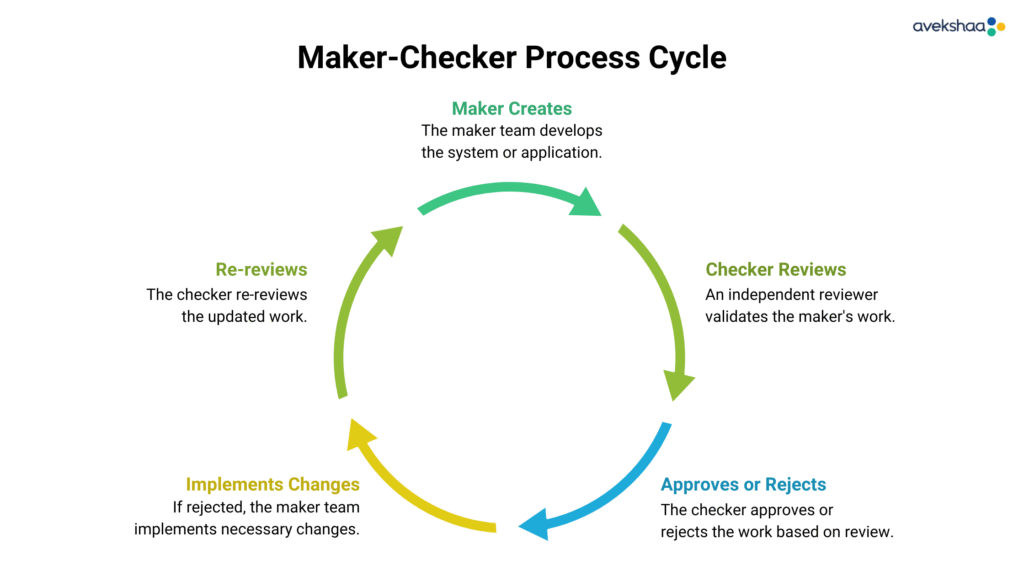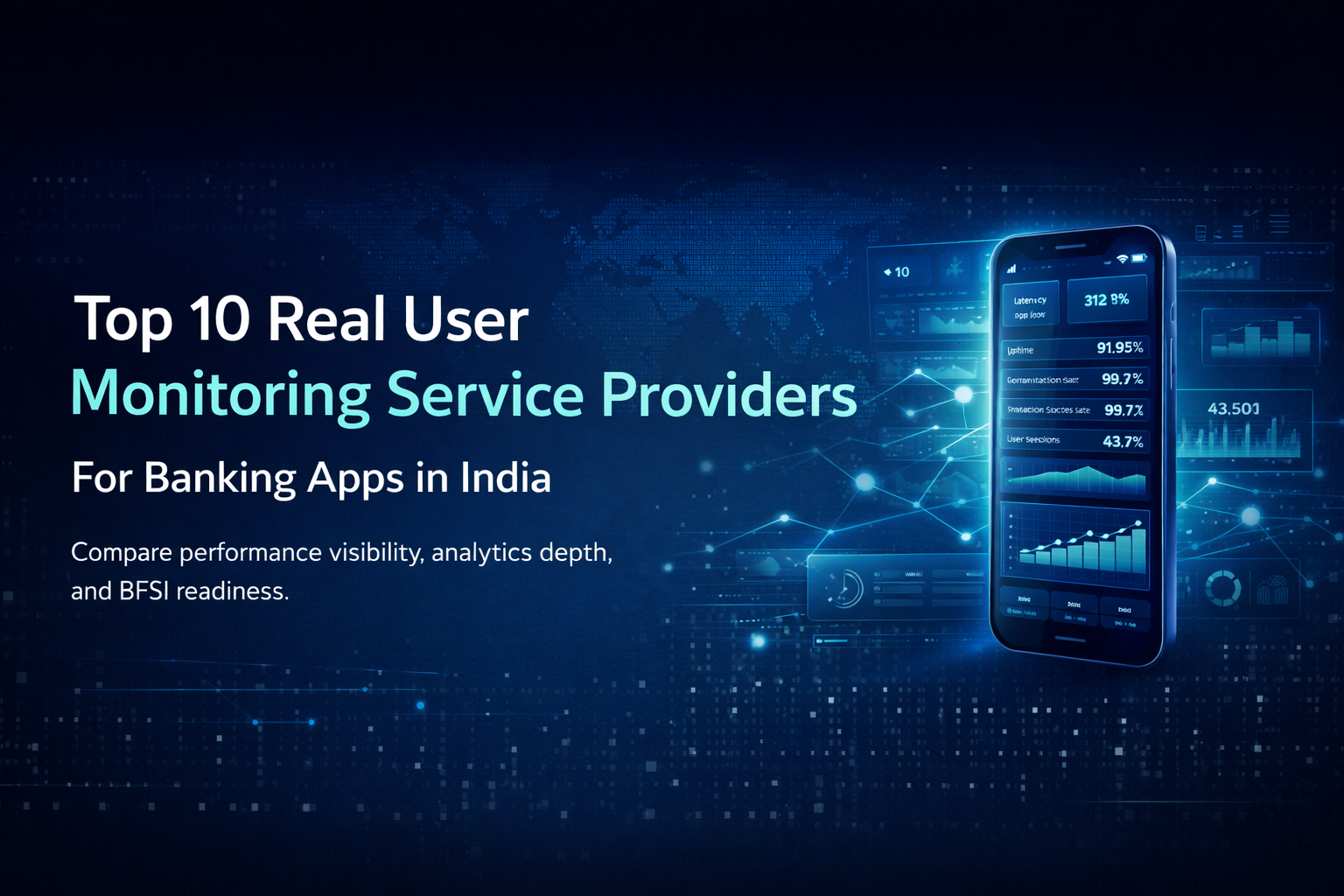What is the Maker-Checker Process?
The Maker-Checker process is a governance and quality-control framework widely used in software development, banking, and compliance-driven industries.
- Maker – The person or team responsible for creating the application, system, or process.
- Checker – An independent reviewer who validates and approves the maker’s work.
This separation of duties ensures that no single team has complete control over both building and validating critical systems. By introducing an independent review layer, organizations can:
- Reduce the risk of errors, defects, and oversights slipping into production.
- Ensure performance, scalability, and compliance standards are met.
- Build accountability and avoid conflicts of interest during the development cycle.

In software development, especially for large business and government applications, the Maker-Checker model provides the objective validation necessary to prevent costly failures and ensure long-term reliability.
Large Outsourced Business Application Development and the Likelihood of Failure
Inaccurate requirement specifications, impact analysis, and the study of business requirements, along with incorrect estimations, are the stones that pave the path to failure. The scope and extent of the project are underestimated, creating hurdles as the project begins to grow. If the project requirements are not well defined and communicated, the customer does not get what was planned, along with software that works incorrectly, numerous errors, and delays. Unprofessional project planning, milestone deliveries, and the lack of a comprehensive roadmap lead to cost overruns, missed deadlines, and inadequate resources.
Common Reasons for Failure
- Inaccurate requirements & impact analysis – leading to unclear project scope.
- Poor estimations & unprofessional planning – result in cost overruns and missed deadlines.
- Incorrect tools & technologies – add unnecessary complexity and technical debt.
- Scope creep – expands budgets and delays delivery.
- Low-quality testing & inadequate validation – defects slip through, hurting customer trust and revenue.
When the same team both creates (makes) and validates (checks) the application, errors are more likely to slip through unnoticed.
Low-quality testing, inadequate quality assurance, and lack of any kind of validation of the designed system can lead to defects and errors in the business application, leading to customer dissatisfaction and lost revenue. And often, this is because of the checking being left to those who are doing the making.
Why Government Projects Face Even Higher Risks
Large-scale government projects add additional complexity:
- Multiple stakeholders with conflicting demands – broken specifications.
- Budget constraints – cut corners on quality assurance.
- Lengthy procurement/tendering processes – delays before execution begins.
- Regulatory compliance requirements – strict rules for security, privacy, accessibility.
- Legacy system integration – new software must work with outdated infrastructure.
- Scale of users & workflows – poor design can cause major performance bottlenecks.
The result? Teams under pressure often push projects forward without thorough checks, creating massive risks down the road.
Introduction to the Maker and the Checker
IT expansion is on the rise across both the private and the government sectors. There is a large-scale digital transformation taking place, leading to an increase in IT spending. As per Gartner, India’s IT spending alone is expected to grow 2.6% in 2023 to reach $112.4 billion.
The sluice gates for large-scale projects have opened and there is a rush to implement accelerated digital transformation in the government sector as well.
However, these large-scale projects, either outsourced, handled internally, or done for the government, are fraught with impediments and high possibilities of failure due to multiple reasons. What was asked for and what was delivered by vendors could be very different and not to the standards expected due to sheer size and complexity.
The role of the maker is to create the business application according to the project requirements, while the role of the checker is to thoroughly validate the application for performance , availability, and scalability, among other factors. Improper validation of projects has resulted in more than 70% of digital transformations falling short of their objectives. About 74% of organisations that have previously started a legacy system modernisation project have failed to complete it.
This end-to-end validation process is critical to ensure that the application meets the needs of the business and its users. It would be beneficial to have an independent third-party vendor (Checker) perform the validation to objectively assess the application’s quality from architecture to implementation.
Benefits of Introducing the Maker-Checker Concept for Large Business Applications
Independent Review
The maker-checker concept involves having an independent reviewer (the checker) who is not involved in the software development process – so as to review the work of the maker. This can help ensure an unbiased and independent review of the work, improving the overall quality of the software. The Global Software Quality Assurance market value is projected to reach $20.21 billion by 2029, growing at the CAGR of 9.6%.
Validation
The checker in the maker-checker concept is responsible for validating the software developed by the maker. This can help ensure that the software meets the requirements of the project and the needs of the end users. Validiation of IT projects has become so crucial in any SDLC before actual deployment that independent validation and verification services are expected to account for $2.1 billion by 2029, according to DATABRIDGE Market Research.
Checker Testing
The checker in the maker-checker concept is responsible for re-testing the software developed by the maker. This process helps identify issues or bugs in the software before release.
This process of validation, review and quality assurance by the checker ensures the improvement of the overall quality of the product. Checker testing is largely considered to be an integral part of Digital Quality Assurance & Engineering, a market that is exploding due to the high acceleration of digital transformation. As per NASSCOM, the addressable market would have grown from $60 billion in 2019 to $76 billion in 2022 at a CAGR of 8%.
Scalability Metrics
The checker in the maker-checker concept can help ensure that the software is scalable by reviewing the design and architecture of the software, thus identifying potential scalability issues early in the development process.
Better Compliance
Government sector projects are often subject to strict regulations and compliance requirements. The importance of compliance is reflected by the Enterprise Governance, Risk & Compliance market which will reach $134.86 billion by 2030. The maker-checker concept helps developers build business applications that comply with required regulations and governance protocols.
Conflict of Interest
By having an independent checker, the maker-checker concept can help mitigate any potential conflict of interest that may arise if the maker is responsible for the final validation and testing of their work.
Avekshaa – The Checker Specialists
Developing large-scale business applications can be complex and challenging, particularly for the government sector. The Maker-Checker concept can help ensure that the software meets the needs of the business and its users, is scalable, and complies with regulatory requirements.
As an experienced provider of independent validation and testing services, Avekshaa can assist in ensuring the quality and success of large software development projects. Our dedicated team of specialists can :-
- Provide an objective assessment of the application’s quality
- Identify potential scalability issues
- Help mitigate any potential conflict of interest that may arise
Click here to learn more about how Avekshaa can help ensure the success of your large-scale business application development projects.


